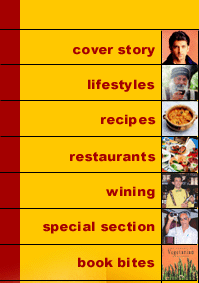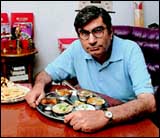


 The Lunchtime Breather
The Lunchtime Breather
VINOD MEHTA, editor of the �Outlook�, recalls 20 years of lunch hours in Bombay, which offered him breathing space from his neurotic work schedules. |
|
In the early Seventies when I first came to Bombay, I found lodgings in a hotel on Wodehouse Road, Colaba, called Buckley Court. This was a Graham Greenish kind of place whose assorted residents included failed revolutionaries, Armenian royalty, vagabonds, dissident Gandhians, unemployed film actors and a few upmarket call-girls.
One of the call-girls, Yasmeen, would occasionally consult me on matters concerning foreign exchange. Her customers frequently left her exotic currency notes and my job was to supply her with the rupee rates.
One day she made a rather strange request: would I accompany her to a family wedding reception. Apparently, her middle-class parents thought she was a decent girl, doing a decent job and in possession of a decent boyfriend. I was required to masquerade as the decent boyfriend, something I readily agreed to do. The wedding reception over in Byculla and I, the suitable boy, suitably approved.
Yasmeen said: �Now, I will do something for you.� Unfortunately, she had dinner in mind. Thus I was introduced to the great Khyber restaurant, then a superb, no-nonsense, smart North Indian eating house where you got real value for money. Currently, I understand it has been ruthlessly refurbished and up-scaled. What this has done to the cuisine is debatable.
The English satirical magazine, Private Eye, has successfully created a character called Lunchtime O� Booze. His job is to guzzle daily between noon and 4 p.m. at posh bars and pubs and clubs and collect salacious gossip. Mr. O�Booze has broken many stories (a few have led to ministerial resignations) and though he does not strictly exist, he has won the British Press Association�s Journalist of the Year Award.
My lunchtime habits, I hasten to add, are much less interesting, even though I too am a dedicated luncher. Certainly, during my professional years in Bombay I was so neurotic, intense and ferocious about my work that by 1.30 in the afternoon I desperately needed rest and recreation. This I chose in the form of the anonymous lunch in havens which were unfussy, uncrowned and (generally) unknown. Lunch became therapy.
I quickly developed a routine. I would purchase two afternoon papers, search a proximate eatery, consume an unhurried (but not leisurely) meal, read about Dimple Kapadia or Nana Chudasama or Alyque Padamsee or, sometimes, even myself, and let the demons gently slink out. The entire package - afternoon papers, anonymous meal, quick stand-up shoe-polish - calmed me miraculously.
For close to seventy minutes I shut out the world of deadlines, missed interviews, exclusives, circulation tangles, dubious scoops, irate politicians... After the allotted breather, I was ready to do battle once again. I scrupulously followed this regimen for nearly 20 years. Therefore, you will excuse me, if in the restaurants I extol the Taj Rendezous and the Oberoi Cafe Royal are absent.
I am not slumming or boasting left-wing credentials. It is not as if the Golden Dragon or the Tanjore, which are fine restaurants, were not in my financial reach; indeed once or
twice a week, by prior arrangement, I did visit the aforementioned altars of high taste, but when you consider my luncheon requirements, you will appreciate why the Rendezvous
did not fit my bill.
The Original Light of Asia did, now alas razed to the ground with the Khan Building. The Irani owner kept a watchful eye on me as a suspiciously white liquid (probably gin or vodka) passed his lips. I forget what I used to order, but I do remember the lightly fried delicious papads which first used to come free with the meal, but as my fondness for them grew, a small surcharge was imposed. The fifty minutes or so I spent every Wednesday at The Original Light of Asia were not just pressure-relieving, they were essential to my sanity.
Of course, if you eat alone in obscure joints occasional social embarrassments are inevitable. On more than a few occasions I caught friends, both married and single, doing a little illicit lunchtime romancing. Close to my office was a small restaurant run by chattering Parsee ladies called (I think) Pattuck�s Corner. The monthly menu, changed daily, was printed like a racing book and after 2 p.m.
Pattuck�s Corner was largely empty and, therefore, a popular venue for assignations. Some places are indelibly etched in my memory. The Sea Lounge at the Taj where I got my first journalistic job. When Susheel Somani asked me how much money I wanted to edit Debonair and I mentioned the figure of Rs. 1,500, he was so embarrassed that he said: �Let us make it Rs. 2,500.� My joy at the enhanced offer was so immense that I ate a second piece of pineapple pastry.
Victory Stall is another location I shall not forget easily. As editor of Debonair I was generally and rightfully shunned by the Bombay journalistic establishment, but on Thursday, I managed to rub shoulders with the best and brightest of the profession. Thursday was dhansak day at the Victory Stall when most of the assistant editors of the Times of India and other self-important journos lined up to share the delights of this delectable open-air, sea-side, beer-serving eatery.
Hi, Vinod, didn�t like your centre-spread this month,� some worthy would remark, and I would secretly mumble, �Didn�t think much of your edit page article on Third World debt either.� Victory Stall, like all good things in life, is no more. A casualty, I believe, to ISI activities.
Close to my Sunday Observer office was Parisian, a favourite of Tata executives. I loved the place because the food was consistent (if a trifle measly), the service was fast (but not over-fast as in Udupi restaurants), and the waiters polite (but not swooning). The eatery was run with exemplary efficiency by a Parsi widower and his teenaged daughter. The Parsi, usually smiling, had a terrible temper reserved. When he shouted and screamed the restaurant trembled. The silent daughter seemed equally frightened of her father as she worked behind the counter handling the money. Nevertheless, father and daughter ran a wonderful luncheonette. It was always packed.
Then one day the daughter disappeared. As happens to teenaged girls, she eloped and got married. The father, one could see, was heartbroken. He began running the restaurant alone. His bad temper vanished, he became listless and morose, the food deteriorated, the waters started running away. Not long after he sold the place. A new owner tried his hand for a couple of months, but the damage had been done. I believe the place is now one of those warrens of offices, known as business centres.
No account of my restaurant life in Bombay is complete without mention of a chilia restaurant opposite Shalimar Hotel with the blessed name of Alla Belli. My poky little flat in Empire Estate building was half-a-minute away, and if in the year 2000 I am of sound mind and body it is thanks to Alla Belli. Not only did it feed me for years on end, but expected and unexpected guests - especially those from Lucknow who by historical tradition never inform in advance they are coming - were never a problem.
Presently I live in India�s capital where old age and respectability have taken their toll on my eating habits. Now, alas, there is much moral formal lunching, but whenever possible I do a Bombay in Delhi. Recently, at a Punjabi dhaba, I was disturbed by a South Indian gentleman. �Are you Vinod Mehta?� I said yes. �I don�t know if you remember, but many years ago in Bombay, we used to meet at the Sher-e-Punjab hotel... by the way which paper did you join after leaving Debonair?�
|

Home Page
About the mag
Subscribe
Advertise
Contact Us